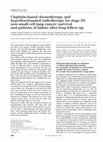Papers by Juan Ignacio Arraras Urdaniz
Análisis y modificación de conducta, 1996

espanolObjetivo: la valoracion del nivel desempeno en actividades de la vida diaria es de gran ut... more espanolObjetivo: la valoracion del nivel desempeno en actividades de la vida diaria es de gran utilidad para desarrollar tratamientos adaptados a las necesidades de cada paciente. Los objetivos de este articulo son presentar la escala de “Valoracion de las actividades de la vida diaria e instrumentales” creada por Mariel Pellegrini, realizar un estudio psicometrico de la fiabilidad y validez de dicha escala, estudiar las relaciones entre el deterioro cognitivo y las variables demograficas con las actividades de la vida diaria basicas e instrumentales. Metodo: se ha evaluado con ella a 80 pacientes que iniciaron tratamiento en la Unidad de Deterioro Cognitivo. Se ha administrado el Mini-Mental State Examination. Se han realizado analisis de fiabilidad y validez de la escala. Resultados: las dos subescalas o secciones (actividades de la vida diaria basicas y actividades de la vida diaria instrumentales) y el global de la valoracion de actividades de la vida diaria e instrumentales cum...
Revista de Oncología, 2003

Revista de Oncología, 2002
The main purpose of this prospective non randomized trial was to analyse whether induction chemot... more The main purpose of this prospective non randomized trial was to analyse whether induction chemotherapy and hyperfractionated radiotherapy combined with cisplatin can improve the long-term survival of patients with locally advanced non small cell lung cancer. From 1992 to 1995, 70 patients received the programmed treatment scheme with: one cycle of induction chemotherapy with mitomycin 10 mg/m 2 /day 1, cisplatin 100 mg/m 2 day 1 and vindesine 3 mg/m 2 /days 1, 8 and 15, followed after 4 weeks of hyperfractionated radiotherapy (1.2 Gy twice/day, five days per week, until total dose of 69.6 Gy) concomitant with cisplatin 20 mg/m 2 /day by continous infusion, for 5 days in the first and fifth weeks of radiotherapy. Patients with stage IIIA, good performance status and radiological partial response were candidated to surgical rescue. Thirty-two patients (45.7%) developed severe toxicity (WHO grade 3-4). Complete radiological response was observed in 9 patients (12.8%). Overall median survival time was 14 months, 2-year survival of 20% and 5-year survival of 12%. The cause of dead was by local progression in 42%, distant metastases in 40%, simultaneous relapse in 10% and intercurrent disease in 8%. Patients with stage IIIA (n = 16, 7 with surgical rescue) had a 5-year survival of 32%, and patients with stage IIIB (n = 54) of 6%. Long-term results with this treatment scheme are disappointing, only patients with stage IIIA and surgical rescue showed an improvement on survival. In spite of chemotherapy and high radiation dose, local-regional progression and distant metastases remain significant patterns of failure and dead of these patients.
Revista de Oncología, 2001

Archivos españoles de urología, 2008
The EORTC Quality of Life Group has developed a questionnaire for evaluating Quality of Life in i... more The EORTC Quality of Life Group has developed a questionnaire for evaluating Quality of Life in international clinical trials: EORTC QLQ-C30, which is widely used in many countries. The purpose of this study was to assess the psychometric properties of the third version of this questionnaire, EORTC QLQ-C30 (version 3.0), when applied to Spanish prostate cancer patients. A sample of 137 prostate cancer patients prospectively filled in the questionnaire three times: on the first and last day of the treatment, and in the followup period. Psychometric evaluation of the structure, reliability and validity was made. Multitrait scaling analysis showed that most item-scale correlation coefficients met the standards of convergent and discriminant validity. Few exceptions appeared mainly in CF Most scales had low to moderate inter-correlations. Cronbach's coefficients of the scales were above 0.7, except for the CF and NV values. Group comparison analyses showed better QL in patients with...
Clinical & Translational Oncology, 2001
Este trabajo pretende presentar la situacion actual de la evaluacion de la Calidad de Vida en el ... more Este trabajo pretende presentar la situacion actual de la evaluacion de la Calidad de Vida en el cancer de pulmon. Su valoracion es de gran utilidad en la practica clinica y en los ensayos clinicos con dicha enfermedad. Hay en la actualidad un debate sobre el tratamiento del cancer de pulmon en el que la evaluacion de la Calidad de Vida tiene un papel clave. Se presenta el sistema de medida de la EORTC para cancer de pulmon, junto con otros dos instrumentos de evaluacion. Se da atencion a aspectos importantes relacionados con la medicion de la Calidad de Vida en dicha enfermedad, entre los que se encuentra su funcion pronostica. Se hace una revision sobre la situacion actual del tratamiento del cancer de pulmon no microcitico en enfermedad avanzada, y del papel clave de la valoracion de la Calidad de Vida en los avances en dicho tratamiento.

Revista Española de Geriatría y Gerontología, 2019
BACKGROUND AND OBJECTIVES Quality of life (QoL) is a key outcome for elderly cancer patients. The... more BACKGROUND AND OBJECTIVES Quality of life (QoL) is a key outcome for elderly cancer patients. The EORTC has developed QLQ-ELD14, a questionnaire that assesses important age-specific issues for older patients with cancer. This study aims to validate QLQ-ELD14 for use with elderly Spanish breast cancer patients. MATERIALS AND METHODS A consecutive sample of breast cancer patients with localized disease (age ≥65) who had received surgery ≥5 years earlier, were disease-free, and may have received adjuvant treatments was included. Patients completed the QLQ-ELD14, QLQ-C30 and QLQ-BR23 questionnaires. A subsample of patients completed QLQ-ELD14 six months later. Psychometric evaluation of the structure, reliability and validity of QLQ-ELD14 was conducted. RESULTS 87 patients completed the first assessment and 30 the second. Multitrait scaling analysis showed that all items except two met the standards for convergent and divergent validity. Cronbach's coefficient met the 0.7 alpha criterion on all scales except worries about others. Areas of QLQ-ELD14 and QLQ-C30 whose contents are conceptually related correlated substantially (Spearman's Rho >0.40). Conversely, areas of QLQ-ELD14 that had less in common with those of QLQ-C30 and QLQ-BR23 had low correlations (Spearman's Rho <0.1). Differences in QLQ-ELD14 were found in groups based on age, disease duration, living arrangement, presence of limiting comorbidity, and level of performance status. Patients had a higher level of worries at the second assessment. CONCLUSIONS QLQ-ELD14 is a reliable and valid instrument when applied to a sample of Spanish patients. Our results are in line with those of other validation studies.
Anales Del Sistema Sanitario De Navarra, 2013
V Congreso Estatal De Intervencion Social Calidad Y Responsabilidad Compartida Retos Del Bienestar En El Cambio De Siglo Vol 2 1999 Isbn 84 8446 013 4 Pags 999 1008, 1999
Revista De Psicologia De La Salud, 1995

Revista De Psicologia De La Salud, 1995
El Grupo de Calidad de Vida (C.V.) de la EORTC ha desarrollado un cuestionario de evaluación de C... more El Grupo de Calidad de Vida (C.V.) de la EORTC ha desarrollado un cuestionario de evaluación de C. V. en ensayos clínicos internacionales: QLQ-C30 .. Métodos: el QLQ-C30 ha sido administrado antes y durante el tratamiento, a dos muestras de 132 pacientes con cáncer de mama y 51 de pulmón. Se han recogido variables sociodemográficas y clínicas. Se ha realizado un estudio estadístico sobre la estructura del cuestionario, su fiabilidad y validez. Resultados: los datos apoyan la estructura y la fiabilidad del QLQ-C30, a excepción de dos escalas. La validez se ha comprobado de cuatro maneras: 1-las correlaciones entre escalas son significativas y moderadas. 2-Algunas escalas e ítems distinguen entre grupos de sujetos con diferentes valores en las variables clínicas. 3-Algunas de estas escalas e ítems también diferencian grupos de sujetos cuyo performance status ha aumentado entre las dos mediciones. 4-El análisis factorial apoya la estructura de la mayoría de las escalas. Conclusiones: estos resultados indican que el QLQ-C30 es un cuestionario fiable y válido cuando se aplica a muestra española. Palabras claves: cancer, Calidad de Vida, cuestionario, validación.

Clinical Translational Oncology, Mar 1, 2001
Assessment of quality of life in patients with terminal cancer Introduction: Research on life qua... more Assessment of quality of life in patients with terminal cancer Introduction: Research on life quality of cancer patients allows giving the attention back to the patient and his/her needs. Materials and Methods: FACT-G survey was performed to 77 terminal cancer patients on the Palliative Care and Pain Relief unit from Iquique's General Hospital. Results: Physical welfare was evaluated with a 21.22 out of a maximum of 28, social/familiar welfare had a 12.57 over 28, emotional welfare was 16 over 24 and functional welfare had 17.33 over 28. Final score, which represents the sum of the four prior divisions, with a scale from 0 to 108, was 67.62% of the maximum score. Conclusions: Performance of life quality surveys is feasible for cancer patients, and allows us to make specific interventions on the patient and his/her close ones to improve his/her life quality.
Clinical Translational Oncology, 2006









Uploads
Papers by Juan Ignacio Arraras Urdaniz